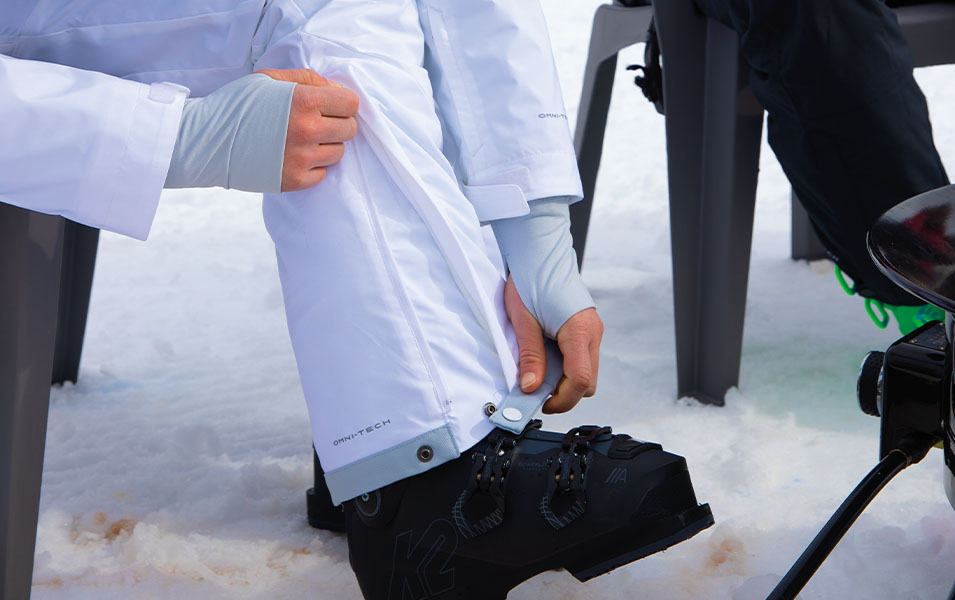
Nordic skiing is one the most loved winter sports around the globe, but it can be difficult. Start with the right equipment, then learn the techniques to be comfortable on different terrain.
New to Cross Country Skiing
A guided lesson is an excellent way to get started if your are new to the sport. Find out if lessons are offered at your local ski area. If they don’t, you can ask your friends for recommendations.
Buy the Right Gear
Choose skis with "fish scale" bottoms. This makes it easier to glide on slippery surfaces without losing control. Ski wax must be specific to the snow you will be skiing on.
Buy skis that are the right size for you, so you won't need to get them resized during a lesson or later. This will save you time and money in the long run, says Amie Smith, executive director of the New England Nordic Ski Association.

Ski boots are a must-have. They should be wide and comfortable to enable you to ski comfortably. A pair of poles will also be necessary. They should be adjustable for different heights.
Don't forget to bring some extra gear for changing weather conditions. When it is cold or windy, a hat, gloves, and warm layers can help you continue to move.
Do not be hard on yourself
To avoid injuries, take it slow and build your confidence. It's best to stay away from downhills at first, and start with groomed trails at a ski area that has tracks set up on the trail.
Glide Up Hill
You can move uphill by using the herringbone method. This involves stepping back while keeping your skis pointed outward. This makes it easier to climb hills that are sloping, and allows you to step up more easily than if you were to walk uphill with your skis pointed inward.
Practicing this technique will make it much easier to do when you're out on your own, so try it the next time you're skiing uphill.

Be dynamic, be balanced
Nordic skiing is a sport where you need to use all of your muscles to propel yourself. You should strive to be agile and strong as a beginner.
Classic (Traditional)cross-country skiing is the most common form of the sport for beginners, because it resembles walking on skis and relies on a kicking and gliding motion as you lean slightly forward. This technique can take some getting used to, but it is a rewarding cardio workout that offers plenty of opportunities for you to practice your technique and enjoy the outdoors.
Cross-country skiing offers a different challenge. It is similar to ice skating but requires you to propel each ski in V patterns. This is more difficult but fun, and you can develop faster speeds.
FAQ
What documents should be kept handy while on the road?
Keep copies of important documents at home for easy access while on the road. Keep a backup of your passport and driver's licence, as well as any credit card information, if you intend to use an ATM.
A photocopy of your passport is always a good idea so that it can be used to prove identity in case of emergency.
Do not forget to include copies and reservation confirmations. These will help you to remember where you are and what you want to see.
Keep a copy of the flight ticket and details for your hotel reservations. If you have any problems, you can always contact someone back at home.
Finally, it's always a good idea not to leave anything valuable unattended. Make sure you have a place to store your valuables, such as a money belt or in your luggage.
Ensure you check your baggage before leaving to avoid losing expensive items.
Keep in mind: It is safer to keep it simple than to plan everything.
Enjoy your journey and relax!
When traveling, what should you remember?
Traveling can be stressful. You'll often find yourself in situations where you have little time to make decisions. It's okay to be spontaneous.
It is possible to be stuck anywhere for hours, days or even weeks. You can plan ahead to ensure you have water, food, shelter, and somewhere to sleep. But, if not, you might have the need to improvise.
In these cases, you'll probably have to rely on what you know how to do best. That means making quick decisions based on instinct and experience.
But sometimes, you won't have any choice. For example, you could be stranded in an area without cell phone service, running out of gas, or having been robbed. These situations will require you to quickly adapt to the situation.
It is important to remain calm, keep your eyes on the prize and be decisive. Don't panic. Instead, stay focused on what you have control of.
You can, for example, choose the direction you want to travel if you get lost in the woods. You can also eat berries and mushrooms if you feel hungry. Rainwater or melting snow are good options if you're feeling thirsty.
Or if you're tired, you can rest. It's okay to bundle up if it is cold. If you're wet, you can change clothes. You will feel happier no matter what, if your outlook is positive
Do you ever worry about forgetting something when you travel?
Yes, I often forget stuff. This is most common on short trips. But I have everything with I, so I never run low.
My passport is one example. Also, I always make sure that I have enough money before I purchase tickets.
I also always have my phone charger with me. For other items, I carry a small bag.
What should vacationers bring?
It's important to decide what you want for your holiday. Not just packing clothes. You should also consider where you are going to be staying and for how long.
Consider what type of activities you'd like to take part in. You might want to go scuba diving if your destination is exotic. You may also be interested in participating in local festivals and events, especially if your stay is longer.
It is crucial that you inform the people responsible for your care if you have any health problems. They can then plan accordingly.
What can I put in my suitcase for travel?
Two pairs of shoes is a good rule of thumb. You need one pair for walking in the city; another pair to go on vacation.
A good idea is to make sure that you have enough clothes in both cases. For plane travel, make sure to bring extra socks, underwear, shirt, and pants.
Consider bringing some clothes if you are planning to stay somewhere for a longer time. This will make it easier to go shopping for new outfits and won't make you feel uncomfortable.
Comfortable shoes are a must if you're going to be taking the train or bus. And if you're driving, you'll need to ensure you've got a spare set of tires.
You should also pack lots of toiletries including shampoo, toothpaste as well as moisturizer and deodorant.
Finally, don't forget a flashlight, insect repellents, sunscreen, sunglasses, a hat and a first-aid kit.
Do not forget to pack all your essentials in one bag. That way, you'll save time and space.
Don't forget to bring a towel and a washcloth. They are very handy for when you need to shower after a long, tiring day.
What should you do the first time you arrive at your travel destination after you have arrived?
You should always have an itinerary for when you arrive at a place. It helps you know what to expect and where to go next.
It is important to plan ahead so you don't forget anything.
You should also research what museums, parks, or landmarks you want to visit if you are planning to visit a city more than once.
A map of the area may be useful and you might want to read up on the history.
Statistics
- You can use compression sacs or cubes to reduce the volume of your clothes by up to 80%—this is especially convenient for bulky items such as sweaters and jackets. (eaglecreek.com)
- They're also likely to offer babysitting services, in case you'd like to have dinner one night after 7 p.m. (travelandleisure.com)
- No Checked Bags: No Alcoholic beverages with more than 70% alcohol (over 140 proof), including grain alcohol and 151 proof rum. (tsa.gov)
- That's an 18% jump from 2019, the previous record year. (travelandleisure.com)
- Alcoholic beverages with 24% alcohol or less are not subject to limitations in checked bags. (tsa.gov)
External Links
How To
How do you make traveling easier?
Everything is easier when you plan ahead. You don't have to worry about where your next stop will be, how much money you'll spend, what to pack, etc. Plan and organize your trip before you go. This way, you won't waste precious time trying to figure things out during your trip.
Plan Ahead
There are many different ways to plan your travels. While some prefer to keep track online of all details, others prefer to make notes in a notebook. Some people find planning to be as important as creating a trip itinerary. Others might just begin packing and move on. Whatever works for you, it doesn't matter which method. Planning will help you save valuable time during your trip.
Organizing Yourself
You must organize your travels if you want to be successful. First, make sure you are clear about what you will need. You should make sure you have everything you need. Consider the weather conditions of your destination country before you pack clothes. Consider whether you will rent a vehicle or prefer public transportation. You should check the facilities that are available when you reach your hotel room. Are there Wi-Fi connections? Does the hotel include breakfast? Do you have laundry facilities at the hotel? These are crucial details to include on your checklist. Once you've checked these items off of your list, you can relax and enjoy your vacation!